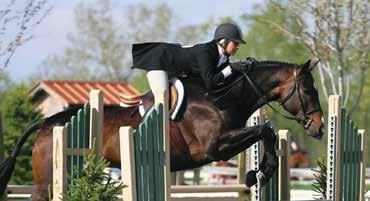
6 minute read
Sport Psychology
Laura King’s Tips for Trainers to Overcome Grief and Anxiety and Help Their Students Do the Same
By Laura King, CHt, NLP & Life Coach
Life is uncertain for trainers and their students. We feel fearful. We feel anxious. We are going through a grieving process. Take this opportunity to be the conduit of calm for your students. Let them know you are indispensably available for them. When Tony Robbins asked Nelson Mandela how he survived 27 years in prison, he replied, “Oh I wasn’t surviving, I was preparing.” Let’s not just survive; let’s prepare! • Avoid making major decisions. Make only those decisions that are absolutely necessary right now, because stress may not be allowing your brain to function properly. If you must make a decision, try to make it in the mornings when you are fresh. • Emptiness and numbness are normal.
That’s my challenge for you as a trainer. Are you complaining? Binge watching? Eating or drinking too much? I get it. We ALL get it. Every one of us has experienced loss. Whether it’s the loss of a loved one, loss of security, loss of freedom to move about, or loss of control, it’s now a part of our lives. It’s inevitable that your journey through the stages of grief (anger, denial, depression, bargaining and acceptance) will be littered with potholes. Give yourself time to process. The journey largely depends on your attitude. You are stronger than you think. You can get through this. You may need to cry, scream or punch a pillow. It’s normal to feel terrible and it’s healthy to acknowledge that you do feel terrible. What is abnormal is to refuse to feel anything or to squelch feelings as soon as they arise. Numbness and emptiness may be a part of your process, but they are different than working against feelings that arise. Whatever surfaces, feel it. Honor it. Sing about it. Sob over it, but don’t busy yourself to avoid your emotions. Be still and allow yourself the space and time to grieve. Your journey through grief will help you refocus your life’s energies toward the future. So, value your feelings and be kind to yourself.
Here are some tips and reminders to help you though this emotional time: a positive. What are you doing today to prepare for the new normal? Can you learn a new skill? Check out inspiring YouTube videos of your equestrian idols or learn how to take better photos or videos of your sale horses. How about reading a self-help book? I suggest The Coffee Bean: A Simple Lesson to Create Positive Change by Jon Gordon and Damon West. What about staying fit and active? There are lots of exercises available online. Google “free 7-minute workout app,” or “equestrian workout,” or “yoga for equestrians.” How about inviting the barn gang to a zoom workout together?
Recognize these feelings and acknowledge them as perfectly appropriate. • The path of your journey through grief is littered with potholes, rocks and, sometimes, boulders. Some days will be easy. You may even think you are through the worst, and then something will trigger overwhelming grief once again. Each time you overcome these stumbling blocks, your heart will heal a little more as you find inner peace. • Remember you are still alive. Life is a gift. Don’t shrink to a depressed observer. Participate in and honor your life from the space you are in. Even though it doesn’t feel like it, this journey is a testament to your inner strength and your courage. • Steady as you go. Grief work is emotional reorganization. • Release feelings of guilt. And then, let’s turn this experience into
Helping your students by being a force of positive change and information is the way to prepare for their future and yours as their trainer. Make yourself indispensable to them as a friend, a cheerleader and a steady beacon of understanding in these uncertain times. Yes, you are sad and lonely and scared and so are they. Be their friend and reach out to them. Let them know you care and that we can get through this together.
Email them exercises they can do at home. Send them that URL to the inspiring YouTube video. If they aren’t able to come to the barn and see their horses, send photos or videos to keep them feeling connected. Deconstruct an exercise such as the
steps to doing a perfect lead change and how to visualize it step-bystep. Teach how to polish boots to get them show-ready or practice having a soft bit-to-hand connection using a jump rope or belts. To help reduce stress, introduce the following technique called bilateral stimulation and be sure to use it yourself. Bilateral Stimulation Exercise This technique stimulates both sides of the brain to help alleviate anxiety. It is absurdly simple yet amazingly effective. This is something you can do anywhere. As soon as you start to feel that anxiety, simply grab an object—keys, a bottle of water, anything will work as long as you are moving both your arms, and across the midline of your body. • Grab a ball (or apple or anything you can toss) and think of something that is causing you anxiety. • When you can feel anxiety somewhere in your body, rate the level of it on a scale of one to 10. • Now, pass the ball back and forth, from one hand to the other, crossing the midline of your body, so you are stimulating both hemispheres of the brain. It will have a more rapid effect if you keep one hand in front of you as the other swings out to the side each time you pass the ball. Do this for a minute. • Stop. Take a deep breath, and check in. You might note that the anxiety has dissipated. This is because by activating both hemispheres, you are spreading blood and electrical impulses throughout the brain and this floods that area of association and diffuses it. That bully of an anxiety cluster just can’t keep itself together. • Now, think of the same situation again and see how much anxiety you can manage to conjure up, and rate it once again on the one to 10 scale. • Pass the ball or other object for another minute, and check in.
Repeat till the anxiety has diffused. First and foremost, take care of yourself, but taking care of your students will help them cope while keeping you top-of-mind when we do come out of this to discover and create our new normal.
Be safe and be well.
Pony Finals Program Full page ad – Due date July 1 Size – 8.5” x 11” Add 1/8” bleed College Guide Program Full page adDue date October 1 Size 4.5” width x 7.5” height dream up.

Equestrian Studies An amazing place to ride, explore and achieve since 1925
• 100% career placement five years in a row • Beautiful historic Equestrian Center just steps from campus • Prince of Wales Riding Club, the country’s oldest continuously active riding clu b • Hall of Fame faculty focused on your personal success
(573) 876-7207 • stephens.edu • inquiry@stephens.edu
Huntseat, Saddle Seat, Western and Driving Four Disciplines, One Family

About the author: I have a mission to increase equestrian emotional intelligence including important coping skills. As a South Floridabased certified hypnotist, sports coach and life coach I believe that overcoming adversity is a pathway to a trainer’s success in these trying times. For more on how Laura can help you become a better, more positive trainer, go to laurakinghypnosis.com or call 561-841-7603.










